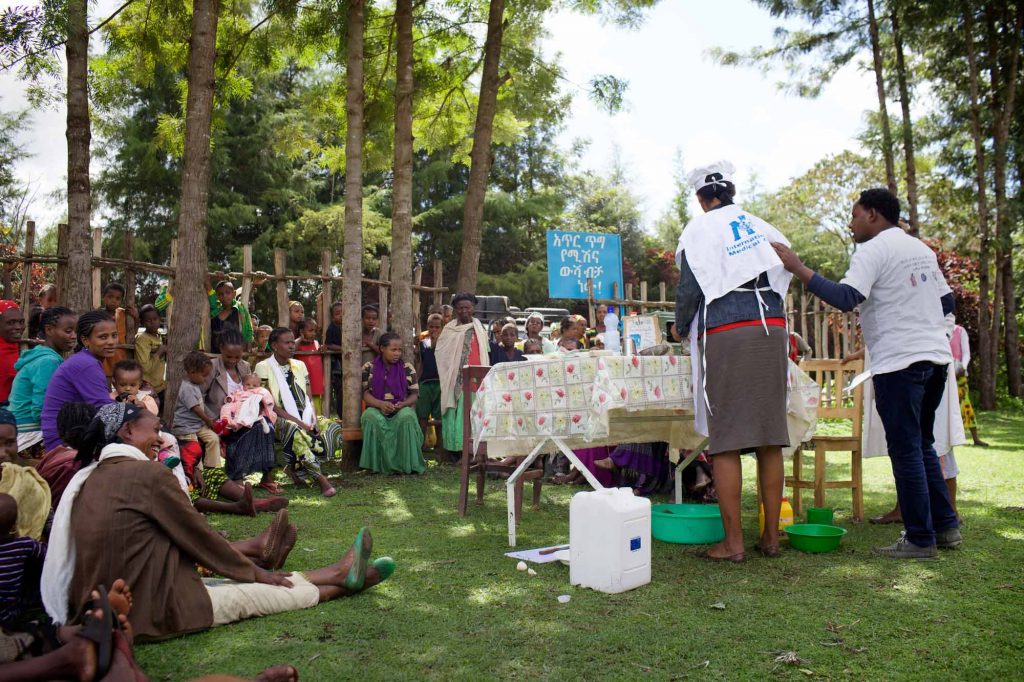
WASH in Nutrition
Water, Sanitation & Hygiene
An estimated one in nine people suffer from chronic undernourishment. Undernutrition is caused by insufficient food intake as well as by health and environmental factors, such as poor WASH, that lead to diseases which prevent nutrients from being sufficiently absorbed by the body.
The World Health Organization estimates that half of all undernutrition is associated with infections caused by poor WASH, such as diarrhea, intestinal worms, and environmental enteric dysfunction.
WASH-related diseases inhibit nutrient absorption and lead to undernutrition and stunting. Poor nutrition in turn lowers resistance to infections and increases mortality from diarrheal diseases and respiratory infections . To break this vicious cycle, International Medical Corps integrates WASH components into nutrition programs.
Our Response
International Medical Corps integrates WASH and Nutrition in its health programming in the following ways:
Water Supply:
• We provide clean water at feeding centers and in communities.
• We provide training on safe water collection, storage and point of use treatment.
Sanitation promotion:
• Our programs promote safe excreta disposal, and work to eliminate the practice of open defecation.
Hygiene promotion:
• We train mothers and caregivers on the importance of handwashing with soap before preparing food and breastfeeding babies.
• We stress the importance of good food hygiene of preparing food on clean surfaces, covering cooked food, and separating cooked and uncooked meats.
Examples of integrated WASH and Nutrition programs:
In Yemen, International Medical Corps is working to support a government target to reduce stunting by at least 20% by 2020. We are also leading a comprehensive, community-based integrated WASH and nutrition program in four districts and providing life-saving support in three additional districts. In these areas only a third of the population has access to safe drinking water and around a quarter have sanitation services. International Medical Corps is conducting extensive community mapping, participatory assessments and community-based action plans to combat stunting with nutrition actions combined with WASH components. As part of the WASH initiatives, we oversee a community-led Total Sanitation initiative, using social mobilization to discourage open defecation and establishing Village Health Committees in 346 villages.
In Ethiopia in 2012, International Medical Corps worked in the country’s water scarce zones of Wolayta and West Arsi, to reduce malnutrition and WASH-related diseases among children and pregnant and breastfeeding women. Through an integrated nutrition and WASH program, International Medical Corps provided 16,500 individuals with access to rehabilitated boreholes, protected springs and shallow wells.
In Zimbabwe, one in every three children suffers from malnutrition. To change this, International Medical Corps is working to improve household food and nutrition security through the Amalima Project, a USAID and Food for Peace-funded food assistance program. Our operations cover some of the country’s most food insecure districts, giving special attention to pregnant and breastfeeding women and to children under 2. WASH is integrated throughout the program, with hygiene messaging incorporated into care group lessons and included as part of ration distributions. At the same time, nutrition is included as part of a hygiene promotion curriculum used in community health clubs.
Malnutrition is the root cause of half of all under-5 child deaths globally. It is estimated that 50% of these cases are associated with diarrhea repeated intestinal worm infections caused by unsafe drinking water, poor sanitation and hygiene, or both.
International Medical Corps admitted more than 113,000 children under 5 to targeted supplemental feeding programs in 2016.
In 2016, International Medical Corps distributed more than 57,000 hygiene kits to beneficiaries.